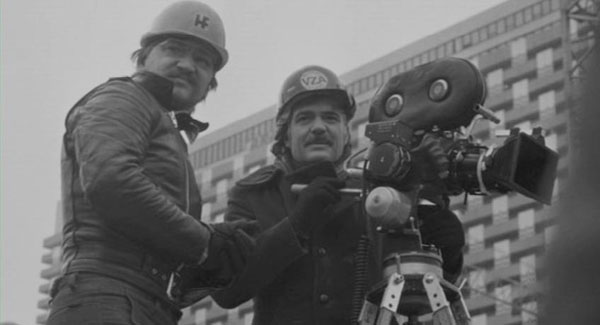Cinematographer Michael Ballhaus talks about working with Rainer Werner Fassbinder in a generous excerpt from mono.kultur #19.
For the Festivalists, Yoana Pavlova talks with Cristina Álvarez López and Adrian Martin about the state of the audiovisual essay and their own work together.
The Financial Times‘ Peter Aspden finds Francis Ford Coppola in a pretty jovial mood: “All these things, the unity of the arts, food, and people coming together, to see a beautiful show or have a good meal, these are the joys that we are blessed with.”
For the Atlantic, Sam Fragoso talks with Spike Lee about “the evolution of his career, what he tries to teach emerging filmmakers in his role as the artistic director at New York University’s Tisch School of the Arts, and the limits of the Hollywood studio system.”
Michael Guillén talks with filmmaker and curator Don Malcolm about French noirs made between the late 40s and early 60s.
Andre Soares interviews Anthony Slide, editor of “It’s the Pictures That Got Small”: Charles Brackett on Billy Wilder and Hollywood’s Golden Age.
Michael Sragow talks with Joe Dante at considerable length about Gremlins (1984).
Also for Film Comment, Violet Lucca talks with Boyhood editor Sandra Adair about “rhythm, the nitty-gritty of her collaboration with Linklater, and the subtle differences between the intuitive and the planned in their process.”
At Flavorwire, Alison Nastasi exchanges email with Joe Rubin, co-founder of Vinegar Syndrome: “We are film archivists who happen to focus on preserving sex films.”
The focus of John A. Riley‘s interview with C.S. Leigh at desistfilm is on the 2004 film Process: “I did everything I could to make the structure fascinating while the content is almost always hard to watch.”
With John Hughes’s The Breakfast Club turning 30, Olivia B. Waxman talks with Molly Ringwald for Time.
Interviews with Approaching the Elephant director Amanda Rose Wilder: Sarah Salovaara (Filmmaker) and Alissa Wilkinson (Movie Mezzanine).
THE WES ANDERSON COLLECTION CHAPTER 8:
THE GRAND BUDAPEST HOTEL from RogerEbert.com
The Wes Anderson Collection: The Grand Budapest Hotel is Matt Zoller Seitz‘s followup to, naturally, The Wes Anderson Collection, and in the video above, he and filmmaking partner Steven Santos lead us into the film by way of Anderson’s previous work. Design Observer‘s John Foster: “Both books were designed by Martin Venezky’s Appetite Engineers in San Francisco…. Martin described himself as ‘[driving] the design locomotive.’ The book is rich with patterns, fabrics, cards, stamps, Venezky-style typographic treatments, and a whole library of books-within-books that support the full story of the film, from initial inspiration through final edit. This kind of complicated ‘design orchestration’ is most certainly a daunting task, but something Venezky handles with grace and ease. I asked him a few questions about how the book came together.”
Viewing (7’59”). For Reverse Shot, Eric Hynes talks with Life Itself director Steve James about “the value of film criticism, his creative collaboration with Ebert, the sense of constant discovery he pursues in making documentaries, and the benefits of being snubbed during Oscar season.”
LISTENING
Elvis Mitchell‘s conversation with Ava DuVernay about Selma and more makes for a terrific half-hour.
The Film Stage has Rian Johnson‘s recent conversation with Christopher Nolan (32’26”).
On the latest episode of The Cinephiliacs, Peter Labuza talks with Doug Dillaman about editing, about his own film, Jake, and about Hayao Miyazaki’s My Neighbor Tortoro (1988) (100’48”). And Movie Mezzanine‘s Kyle Turner interviews Peter Labuza (54’03”).
Adam Schartoff‘s guests on Filmwax Radio are George Schmalz, who talks about Kickstarter’s Archives Project, Amanda Rose Wilder (Approaching the Elephant) and Brandon Colvin and Tony Oswald (Sabbatical).
For news and tips throughout the day every day, follow @KeyframeDaily. Get Keyframe Daily in your inbox by signing in at fandor.com/daily.




